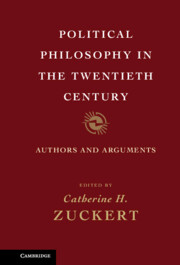Book contents
- Frontmatter
- Contents
- Contributors
- Introduction: political philosophy in the twentieth century
- Part I The three basic alternatives in the early twentieth century
- Part II ??migr?? responses to World War II
- Part III The revival of liberal political philosophy
- 8 Friedrich Hayek on the nature of social order and law
- 9 Michael Oakeshott: the philosophical skeptic in an impatient age
- 10 Moral pluralism and liberal democracy: Isaiah Berlin's heterodox liberalism
- 11 H. L. A. Hart: a twentieth-century Oxford political philosopher
- 12 John Rawls and the task of political philosophy
- 13 Richard Rorty: liberalism, irony, and social hope
- Part IV Critiques of liberalism
- Index
- References
10 - Moral pluralism and liberal democracy: Isaiah Berlin's heterodox liberalism
Published online by Cambridge University Press: 05 June 2012
- Frontmatter
- Contents
- Contributors
- Introduction: political philosophy in the twentieth century
- Part I The three basic alternatives in the early twentieth century
- Part II ??migr?? responses to World War II
- Part III The revival of liberal political philosophy
- 8 Friedrich Hayek on the nature of social order and law
- 9 Michael Oakeshott: the philosophical skeptic in an impatient age
- 10 Moral pluralism and liberal democracy: Isaiah Berlin's heterodox liberalism
- 11 H. L. A. Hart: a twentieth-century Oxford political philosopher
- 12 John Rawls and the task of political philosophy
- 13 Richard Rorty: liberalism, irony, and social hope
- Part IV Critiques of liberalism
- Index
- References
Summary
When the definitive history of political theory in the twentieth century is written, Isaiah Berlin will take his place as one of the most distinguished representatives of the liberal tradition. His was an unorthodox liberalism in both substance and method, and during an era dominated by John Rawls, Berlin's distinctive merits were eclipsed. Today they are becoming more visible. Berlin was less systematic than Rawls, but he reflected more deeply on fundamental alternatives to liberalism and to the Enlightenment outlook that forms liberalism's customary backdrop. He wrestled more explicitly with the tension between universalism and particular attachments in the liberal tradition and in human affairs. And although in later years Rawls reconfigured – some believe disfigured – his theory to accommodate the “fact of pluralism,” Berlin went farther, not only in explaining this fact but also in assessing its value.
Berlin was born in Riga, Latvia, in 1909, the only child of a prosperous merchant and an adoring mother. In 1916 the family moved to Petrograd, where they remained until 1920, when rising political instability and pressure from the new Bolshevik regime sparked their removal to London, where Berlin spent the next eight years. He attended Oxford from 1928 until 1931, spent a year as a tutor at New College, Oxford, and was then elected a fellow of All Souls’ College, his intellectual home for decades. He quickly became the center of a philosophic circle that included A. J. Ayer, the enfant terrible of logical positivism; the redoubtable ordinary-language philosopher John Austin; and his student/critic Stuart Hampshire. At Oxford he began to develop the dense network of social, intellectual, and political relationships that was to characterize the remainder of his life.
- Type
- Chapter
- Information
- Political Philosophy in the Twentieth CenturyAuthors and Arguments, pp. 154 - 169Publisher: Cambridge University PressPrint publication year: 2011



